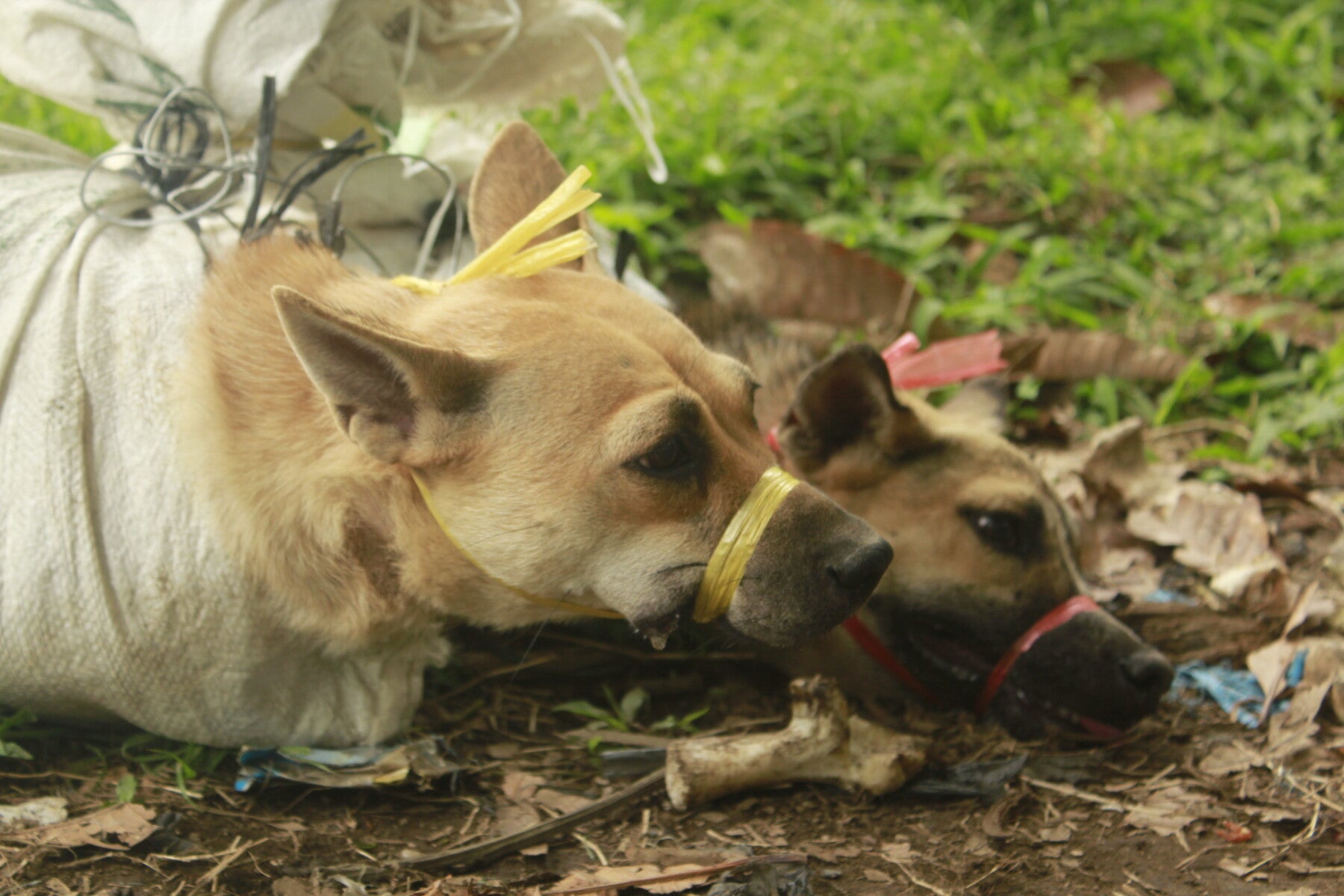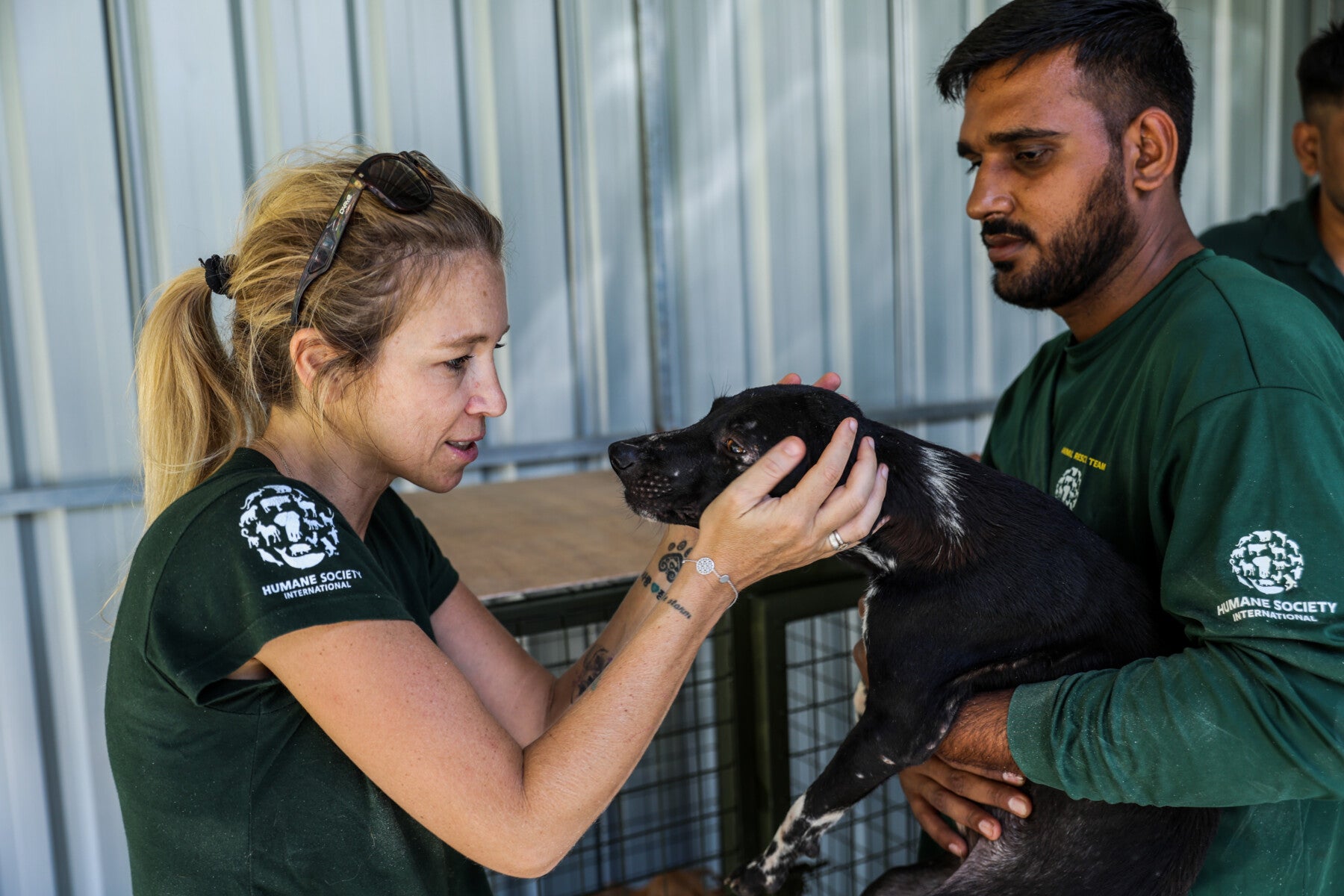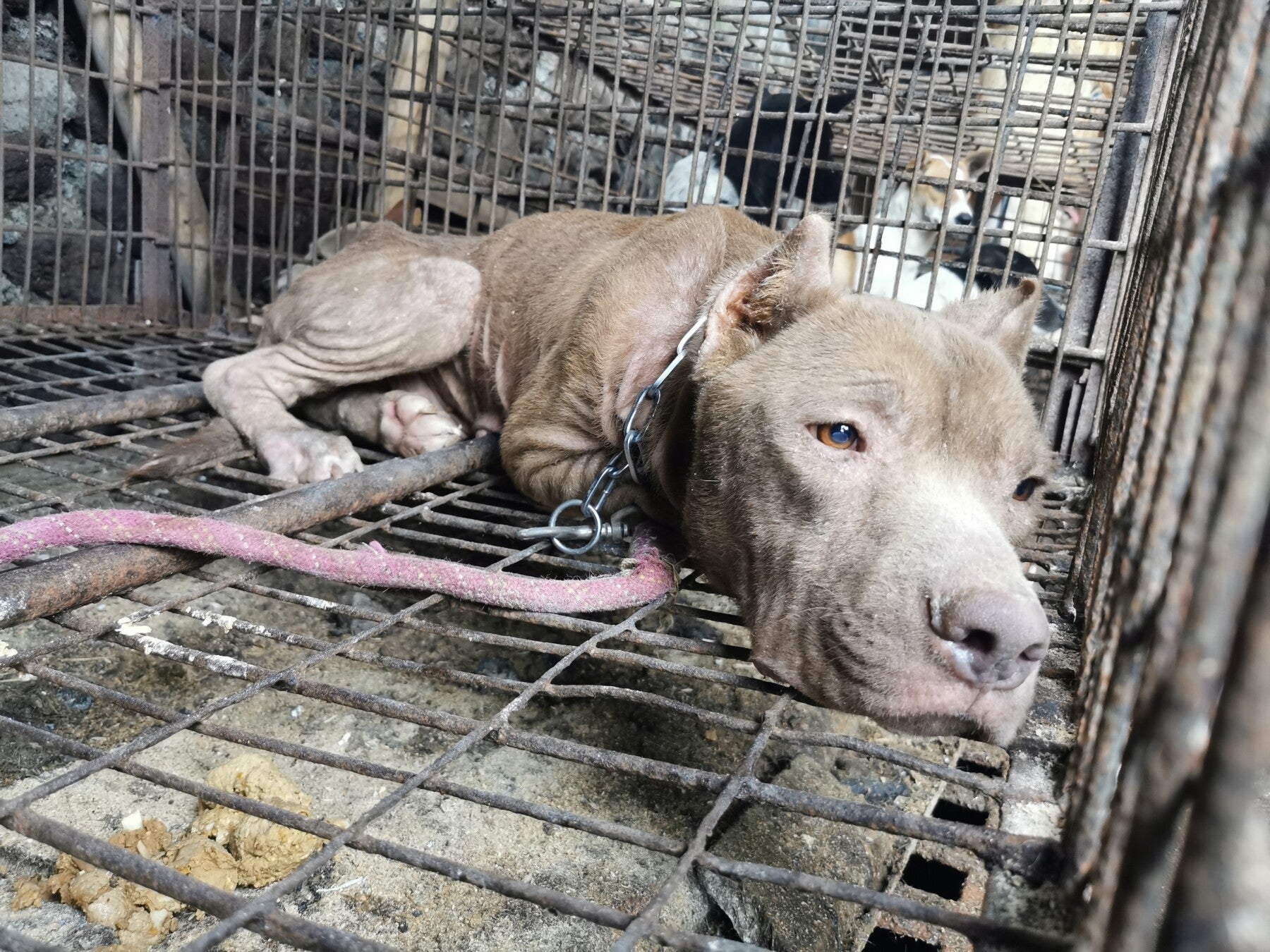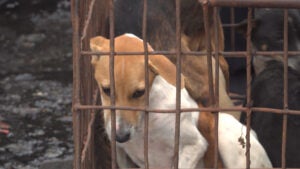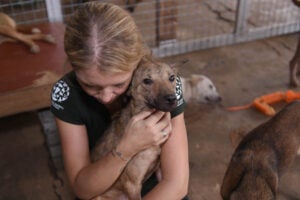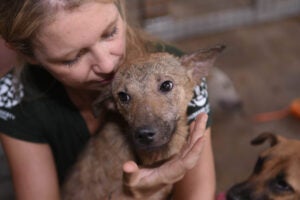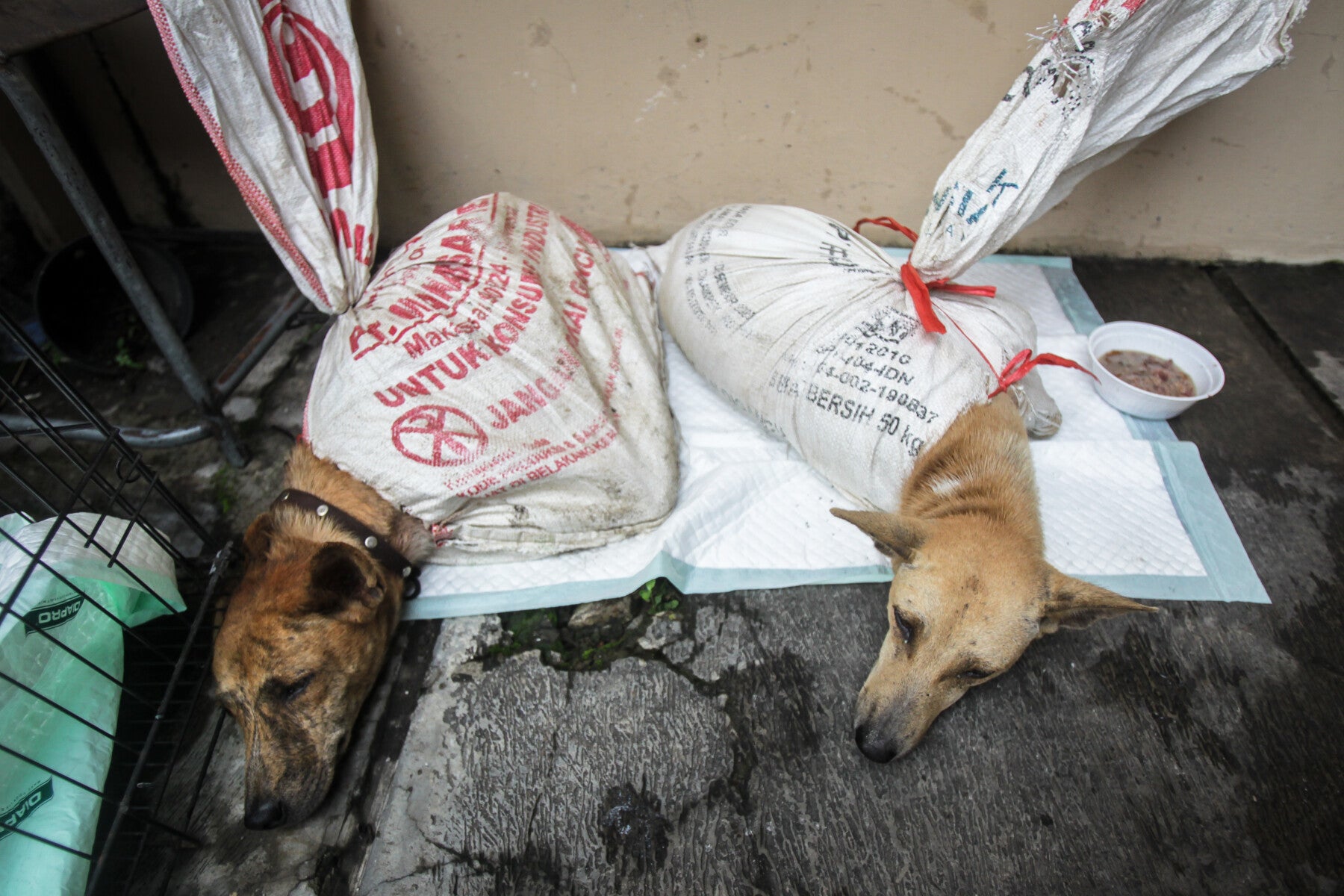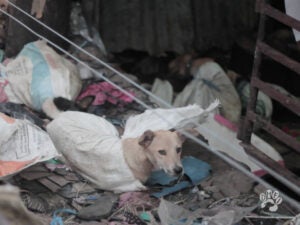
JAKARTA, Indonesia—Lawyers from the Dog Meat Free Indonesia coalition have submitted three legislative proposals to the House of Representatives to transform companion animal protection in Indonesia, including a ban on the cruel dog and cat meat trades. If passed, these would be Indonesia’s first ever laws dedicated to the protection of companion animals, and would make Indonesia the sixth nation in Asia to explicitly ban the dog and cat meat trades.
The draft laws were officially handed to Dr. Bob Hasan S.H., M.H., Head of Legislation, along with an open letter to newly elected President Prabowo on behalf of DMFI supporters from around the world urging him to take decisive action to end the trades.
DMFI—a coalition comprising national and international animal protection organizations Jakarta Animal Aid Network, Animal Friends Jogja, Humane Society International, Animals Asia and FOUR PAWS—has campaigned for an end to the dog and cat meat trades for years, conducting numerous shocking investigations into Indonesia’s underworld network of dog and cat thieves, traffickers, traders and slaughterers. As a result of DMFI campaigns, more than 70 cities, regencies and provinces ―including the Special Capital Region of Jakarta—have introduced directives and regulations to prohibit the trades. Despite this, there is no national ban in place, without which effective enforcement remains a challenge.
These groundbreaking proposals seek to significantly strengthen Indonesia’s national laws which currently are too weak to afford animals the legal protection they need from abuse and neglect. The three draft national legislative regulations comprise a national companion animal protection law, a government regulation to ban the dog and cat meat trades and a Presidential regulation to establish a taskforce to tackle deadly rabies. Combined, these would not only broaden the scope of what constitutes animal cruelty, abuse and neglect, but would also ensure penalties in line with the amended Criminal Code of 10-50 million IDR and up to 18 months in prison.
Karin Franken, DMFI national coordinator, said: “These historic legislative proposals provide a vital opportunity for Indonesia to eliminate the brutal and dangerous dog and cat meat trades once and for all, safeguarding the welfare of both people and animals. More than a million dogs and cats every year are stolen, trafficked and killed for meat in a trade that directly jeopardizes the health of the nation’s citizens. These animals endure grueling journeys, heatstroke, dehydration and disease, only to be bludgeoned, blowtorched and killed for a meat that virtually no-one in Indonesia eats.”
Lola Webber, DMFI international coordinator, added: “The cruel dog and cat meat trades also represent an unacceptable risk to human health and jeopardize Indonesia’s commitment to the Global Target of ‘Zero Deaths Due to Rabies’ by 2030. The dog meat trade and efforts to eliminate rabies are totally incompatible, given that the dog meat trade encourages the mass movement of dogs of unknown disease and vaccination status across provincial borders, disrupting canine vaccination efforts and facilitating the transmission of the deadly disease. The dog meat trade operates in breach of canine rabies elimination recommendations by all leading human and animal health experts and there is quantitative and qualitative evidence from throughout the region highlighting the risk these trades pose to public health. With rabies still endemic in 26 provinces nationwide, these are extraordinarily compelling reasons why we urge the parliament and President Prabowo to support the passage of these regulations and make Indonesia the next nation in Asia to ban the dog and cat meat trades.”
The three draft regulations explained:
- National Law on the Elimination of Violence Against Companion Animals: This would criminalize a broad array of cruel acts including torture, neglect, electrocution, poisoning, cruel chaining or confinement, as well as physical and sexual abuse (bestiality). It would also enshrine in law the principles of responsible pet guardianship as well as establish an animal welfare committee to, among other things, advise on the formulation and implementation of animal welfare laws. This law also Includes prohibitions on all aspects of the dog and cat meat trades including stealing, catching, breeding, trafficking, selling or slaughtering dogs and cats for human consumption as well as selling dog and cat meat for such purposes.
- Government Regulation on the Nationwide Ban on Dog and Cat Meat Trades: This would be Indonesia’s first ever nationwide law banning the dog and cat meat trades for both commercial and non-commercial purposes. Under this law it would become illegal to catch, transport or slaughter dogs and cats for consumption and to store, pack, process, distribute or sell their meat either through traditional or electronic markets.
- Presidential Regulation on the creation of anti-rabies-transmitting animal meat trade: In recognition that rabies is a priority zoonotic disease endemic in 26 Indonesian provinces, with clearly established links to the dog meat trade, this law would support Indonesia’s One Health Roadmap to eliminate the disease in humans nationwide by 2030 by establishing a legal taskforce to work with law enforcement agencies to directly tackle the dog and cat meat trades. The taskforce would be empowered to carry out inspections and investigations and to advance enforcement and legal prosecutions in cases of infringements.
A Nielsen opinion poll in January 2021, commissioned by DMFI, revealed that 93% of Indonesians support a national dog meat ban with fewer than 5% having ever consumed dog meat and 88% agreeing that the issues of the dog meat trade and consumption of dog meat need to be addressed immediately by all political parties.
Across Asia the trade in and slaughter, sale and consumption of dogs and cats is explicitly banned in Taiwan, Hong Kong, the Philippines, Thailand and South Korea (coming into force 2027). In other countries such as Singapore and Malaysia, while there are no explicit bans, the trade is essentially prohibited under existing animal welfare, animal cruelty and animal or food hygiene laws. In addition, the trades are banned in two major cities in mainland China (Shenzhen and Zuhai) and the city of Siem Reap in Cambodia. If passed into law, the proposed regulations would make Indonesia the sixth nation or territory in Asia to explicitly ban the trades.
Now that the regulations have been submitted to Parliament, a period of review and discussion will take place later this month to decide if the national law is approved for inclusion in the national legislative program. If approved, and following a public hearing, a dog and cat meat trades ban could be in place within five years. The government regulation would then be created no later than two years afterwards as an implementing regulation of that new national law. President Prabowo himself has full discretion to ratify the Presidential regulation at any time following discussion with the Parliament.
ENDS
Media contacts:
- Adrian Hane, DMFI attorney, legal and advocacy manager: +6281213421407; adrian@jaandomestic.com
- Karin Franken, DMFI coordinator: +6282122487794; jaan_adopt@yahoo.com
- Lola Webber, DMFI coordinator: +6281337408768; Lolawebber@yahoo.co.uk

